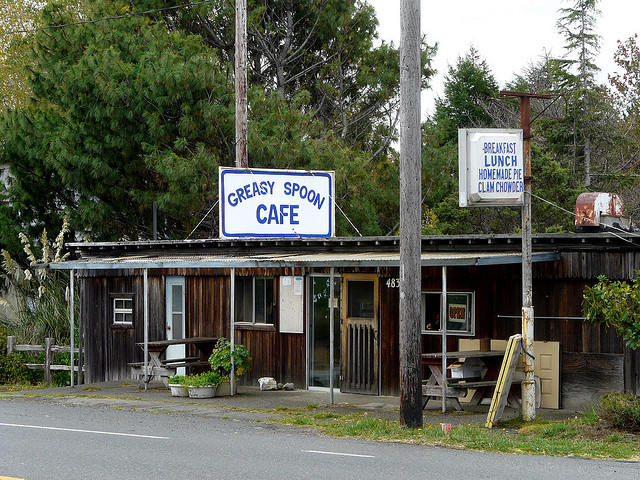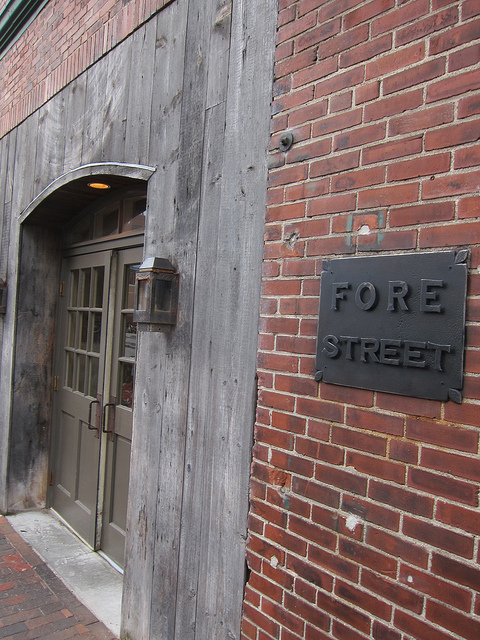
I was not allowed to walk or ride my bike along the highway without an adult. “Blonde hair and blue eyes,” my grandma would tell me. “Just the kind they’d want to steal.” As though at any moment, I could be taken and sold for profit like a chunk of copper wire.
“They’re not gonna steal me, Grandma,” I would tell her. “I’m too mouthy.”
Along Highway 101 on the Oregon coast, there was more to worry about than just staying clear of cars. Seedy hitchhikers and fleeing criminals, maybe murderers or maybe just the kind that siphon gas from the Community Church’s youth group van; people who steal roofing from houses and pick clean the boneyard of the Old Mill. It sounds like an exaggeration listed together like that, but one could verify each of these in the local paper.
My mom grew up here, too. “Don’t get any ideas,” she said to me once, when we were talking about living along the highway, a phrase that every kid knows is the preface to an interesting story. She told me when she was about 13 or 14, I can’t remember exactly, she used to sneak out of my Grandma’s house when she couldn’t sleep. She’d walk around town under the stars at midnight, and one night decided to head down to the Post Office, since the building stayed open 24/7. There were no lights on, and she tripped over a body in a sleeping bag and screamed. It ended up being a man from Canada, who was biking down the Pacific coast, and had decided to stay the night on the floor of the Post Office. After realizing she’d scared him more than he’d scared her, they stayed up the rest of the night and talked for hours, sitting under the PO boxes.
So my mom got to do awesome things like going out in the middle of the night and meeting foreign strangers, who were probably good looking and interesting and read books, and I wasn’t even allowed to walk to the convenience store.
One of the only other kids in my neighborhood, Lily, loved to rub in that fact. She got to walk along the highway to the Post Office by herself to check the mail. So, at Lily’s house, I decided what my Grandma didn’t know wouldn’t hurt her. Still, I was cautious. “We’re taking Spooky,” I said, thinking of Lily’s geriatric golden retriever. “He’s totally an adult.”
After that first time, whenever I went to Lily’s house, we would “check the mail” about four times an afternoon, sometimes even leaving Spooky behind to sleep. There, along the highway, the passing sound of semi trucks hauling timber echoed the sound of the ocean, just a mile away. The Post Office was a block from the highway, on Jackson street, though you would only know that if you lived there, because the street sign was perpetually weather-worn to the point of being unreadable. It was a tiny building right behind the Greasy Spoon, the actual name of the only restaurant in town, which was a single-wide trailer with six ripped up vinyl booths and a kitchen. Across from the Post Office were the remnants of an appliance store with a sign that read: Washers, Dryers, Frezzers. There was an RV parked in the appliance store lot, with a newer sign attached to its siding that said Hummers, $18.
After walking back from getting snacks at the convenience store, Lily nodded toward the RV. “My mom says his carved hummingbirds probably aren’t even worth that much.” She added as an afterthought, “Even if they are made out of cedar.” Her mom owned a roadside art gallery.
“Well, my uncle told me that guy has an alligator,” I said, not wanting to be outdone.
“Then let’s see it.”
“I don’t think we should,” I said, suddenly realizing that the only way to prove I wasn’t lying was to talk to a total stranger, which was definitely going to be crossing the line of things I could justify to my grandmother.
“Come on,” Lily said. “It’s an adventure.”
Lily knew my weak spot. She knew I wanted to grow up to be a secret agent. “All right, I’ll do it.”
I stepped up to the Washers, Dryers, Frezzers building and knocked. We waited and listened, but didn’t hear anything. “Maybe it’s the wrong place,” I started to say, but an old man in overalls and a trucker hat came out of the RV.
“What do you kids want?” he asked, in the grumpy way a person would expect.
“My uncle told me you had an alligator?” I said as a question, even though it wasn’t one.
His face changed to a smile. “Oh! Yeah, sure I do.” He turned to walk into the appliance building, and Lily and I exchanged a Holy Shit look.
“Well, come on in here,” he said, expecting us to follow.
Oh man, I thought. My grandma was right. He’s going to steal us.
Lily pushed me, knowing what I was thinking, and we both stepped in. Under a section of chicken wire was a huge metal tub. I was already in too deep to be saved and stepped closer to see that, yes, my uncle had been right. The man who carved cedar hummingbirds had a pet alligator.
“He’s only a little guy,” the man explained. “About four feet long. He’ll grow to be twelve.”
“Will you have to take him out of the tub?” I asked.
“Oh, yeah, yeah, something like that,” he said, looking at the alligator with pride. “You girls want to see him walk around?”
It was even better than we had expected. Hummer Guy picked up the alligator and set him on the gravel, right in view of the Post Office. I felt much more comfortable knowing, that at any moment, someone I knew could check their mail and see me in broad daylight, even if there was an alligator there.
“His name is Harm,” he said, “like ‘stay outta harm’s way.’ You can pet him.”
I gave Harm a few pats on the head, feeling his tough dark skin. I don’t remember if Lily touched him or not, but afterward we thanked the man and said we should probably head back to Lily’s house. As we walked toward the highway, I popped a Rolo that I’d bought at the convenience store into my mouth, right as Hummer Guy called out after us, “Remember to wash your hands after touching him, or you could get salmonella!”
I worried for a half a block that I would die a horrible salmonella death, and my grandma would know that I had walked to the highway, but then decided it was worth the risk.
Jane Campbell is an artist and writer living in Eugene, Oregon, and her non-fiction has appeared in Gravel Magazine.
Photo by Flickr Creative Commons user Oh Kaye.




